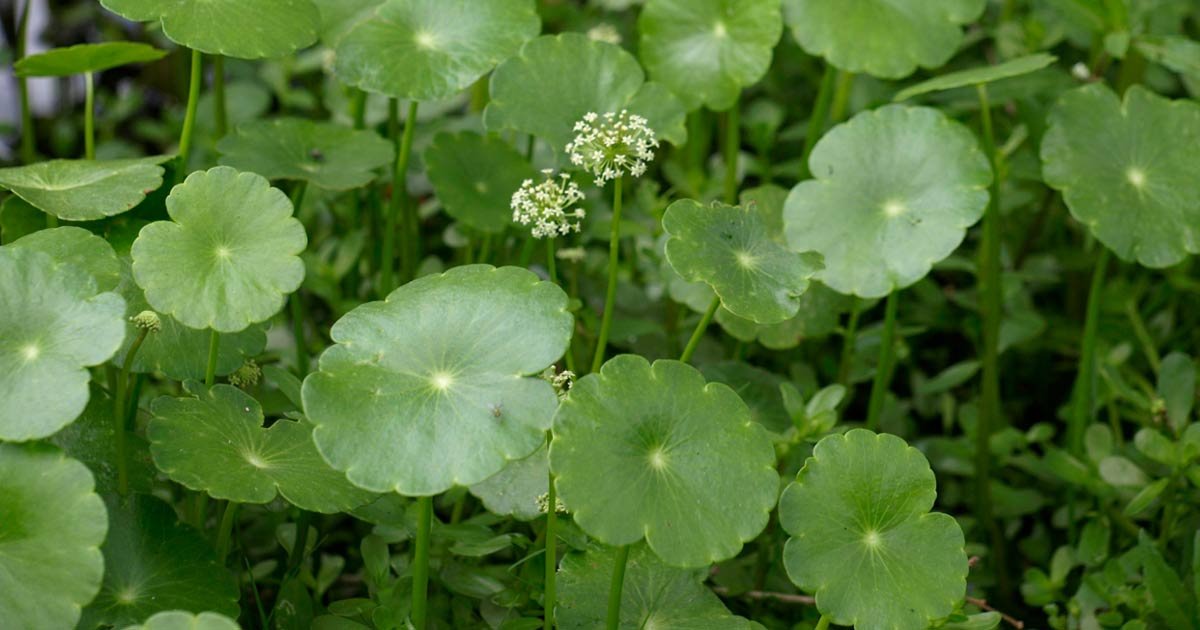Dollar weed, also known as pennywort, is a relentless perennial weed that poses a challenge for homeowners aiming for a pristine lawn. Characterized by its rounded leaves and ability to thrive in areas with high moisture levels, dollar weed spreads quickly, overtaking your grass and diminishing your yard’s beauty. Tackling this water-loving plant can feel overwhelming, but with the right strategies, you can reclaim your lawn.
This guide will walk you through various methods to handle dollar weed, from manual removal to effective dollar weed herbicide options and preventive measures. Once you know how to get rid of dollar weed in lawn, you can also enhance your lawn health with proper care to keep it lush and weed-free.

What Is Dollar Weed?
Dollar weed (Hydrocotyle spp.) gets its common name due to its bright green, coin-shaped leaves. While native to wetter regions, this water-loving plant is invasive for most lawns, particularly in areas with poor soil drainage or overwatering. It competes with grass for nutrients, leaving unsightly dollarweed plants scattered throughout the yard.
Characteristics of Dollar Weed:
- Leaves
Dollar weed is easily identified by its flat, circular, rounded leaves with wavy margins that resemble scallops. - Flowers
Although rare, dollar weed produces small white flowers, typically during the growing season. - Growth Pattern
This weed uses underground runners (or rhizomes) to spread quickly in damp soils, making it resilient and difficult to eliminate. - Moisture Preference
Dollar weed thrives in areas with high water content, making it a common issue in lawns with excessive irrigation or near bodies of water.
How to Identify Dollar Weed in Lawn
Proper Weed Identification ensures you’re dealing with dollar weed, not another invasive plant. Here’s what to observe:
- Leaf Shape
Look for circular leaves with a sheen, each attached to the stem at the center. - Growth Locations
Dollar weed favors moist, low-lying areas with poor soil drainage. - Spreading Pattern
It spreads outward in clusters, creeping with underground rhizomes. - Flower Appearance
Few see them bloom, but if conditions allow, it produces tiny white flowers during warm weather.
Causes of Dollar Weed Growth in Lawns
Dollar weed thrives when conditions favor its invasion. Understand these causes so you can tackle the root of the problem:
1. Excess Watering
Dollar weed flourishes where moisture levels are consistently high. Overwatering or a poorly maintained irrigation system may lead to water pooling, which invites its growth.
2. Poor Lawn Drainage
Areas with compacted or poorly draining soil provide ideal habitats for dollar weed. Improve soil drainage to discourage its establishment.
3. Nutrient Deficiency
Grass weakened by low-quality soil or improper fertilization can’t compete with resilient weeds like dollar weed. Regular feedings with the right fertilizer can help grass resist weed growth.
4. Short Grass Height
Mowing grass too short can expose soil, creating openings for dollar weed to spread. Balance cutting frequency with proper grass height for a healthier lawn.
5. Shady Areas
Dollar weed loves shady areas where grass struggles to thrive. Trimming trees or selectively replanting grass types like centipede lawns that handle shade can help.
How to Get Rid of Dollar Weed
The method you choose depends on the size of the infestation and your lawn preferences. Here are effective removal techniques:
Manual Removal
This option works well for small or isolated patches:
- Prepare the Soil
Water the area first to create moist soil, making it easier to pull the weed up with its deeper root system intact. - Pull by Hand
Grip the weeds near their base and gently pull them out, ensuring no rhizomes are left behind. - Dispose Safely
Bag and discard all uprooted dollarweed plants to prevent seed dispersal.
Organic Methods
If you prefer natural ways to kill dollar weed, try these solutions:
- Boiling Water
Pour boiling water directly onto dollarweed plants. Be cautious of grass, as boiling water harms all plants in its path. - Vinegar Solution
Mix white vinegar with a small amount of dish soap and spray directly on dollar weed. The soap helps the vinegar adhere to the leaves. - Improving Drainage
Aerate your lawn to prevent water pooling and address compacted soil for better drier soil conditions. - Mulching
Cover problem areas with plastic sheeting or mulch to starve weeds of sunlight.
Chemical Herbicides
For large-scale infestations, chemical herbicides may be the best option:
- Selective Herbicides
Use a dollar weed herbicide labeled specifically for broadleaf weeds like pennywort. Products designed for lawns won’t harm grass. - Non-Selective Herbicides
Spot-treat stubborn weed clumps with a non-selective herbicide for quick removal, but take care to avoid other plants. - Pre-Emergent Herbicides
Applying pre-emergent Weed Killer can prevent dollar weed seeds from germinating in the spring.
Pro Tip
Always follow label directions when applying herbicides to ensure safety and effectiveness.
Best Time of Year to Remove Dollar Weed
Timing matters when addressing dollar weed. Here’s what you need to know:
- Spring
Early spring is ideal for pre-emergent treatments to prevent seeds from sprouting, while manual removal is easier in moist soil. - Summer and Early Fall
Actively growing dollar weed is responsive to herbicide treatments during warm months.
Prevention Tips to Avoid Dollar Weed Regrowth
With dollar weed removed, taking additional steps can help prevent its return:
- Check Irrigation Levels
Only water your lawn when needed, providing about an inch of water weekly under normal conditions. During a dry spell, adjust irrigation sparingly. - Improve Lawn Drainage
Aerate your yard to reduce soil compaction and boost soil drainage. - Regular Feedings
Use a balanced fertilizer to promote dense growth and enhance grass health so it outcompetes weeds. - Mow Properly
Avoid scalping your lawn. Keeping grass at its optimal height (3-4 inches for most types, or specific to centipede lawns) shades out dollar weed. - Monitor for Early Outbreaks
Conduct regular Weed Identification checks to spot dollar weed or other weeds before they spread.
Conclusion
Dollar weed can wreak havoc on an otherwise well-maintained lawn, but with the right solutions, you can take control. Whether you choose manual removal, organic methods, or chemical herbicides, consistency is key. Proper lawn care practices like aeration, mowing, and fertilizing will also keep your grass healthy and resistant to new infestations.
Start implementing these strategies today to master how to get rid of dollar weed in lawn and enjoy a vibrant, weed-free yard for seasons to come.
Frequently Asked Questions about Dollar Weed
What kills dollar weed?
The best solutions include selective dollar weed herbicide, natural remedies like vinegar or boiling water, and improving moisture levels in your lawn.
Will dollar weed go away on its own?
No, without action, dollar weed will continue to spread and dominate your lawn.
Is dollar weed dangerous to pets?
Dollar weed itself is not harmful, but herbicides used to treat it may pose risks. Follow label directions and keep pets away until the treatment dries.
Can dollar weed damage my lawn mower?
Dense patches likely won’t harm the mower but could clog blades. Removing weeds before mowing is recommended.
Should I call a professional for dollar weed removal?
If your lawn has a severe infestation or DIY methods aren’t working, hiring a lawn care expert is a wise decision for effective and lasting results.
Fight back against dollar weed and reclaim your yard today!

Anamika is a passionate writer for Eco365Store.com, specializing in topics that inspire a cleaner, greener world. With expertise in home cleaning, recycling, and eco-friendly solutions, she crafts engaging and informative articles that help readers adopt sustainable practices in their daily lives.

